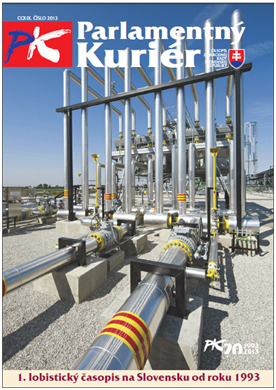Determining factor is new value system - published in Parlamentný Kuriér 2013

SLOVAK POWER ENGINEERING
The basis for the transformation to a sustainable society when using renewable energy resources with least possible investments is primarily a transformation of the whole society to a new value system. One of the most outstanding specialists of the The Centre for Research on Economics of Renewable Energy Sources and Distribution Systems (Centrum pre výskum ekonomiky obnoviteľných zdrojov energie a distribučných sústav) is its founding member Dušan LUKÁŠIK who was interviewed by an editor of Parlametný kuriér, Anna Komová.
In 2008 you founded the Centre for Research on Economics of Renewable Energy Sources and Distribution Systems together with TU (Technical University) Košice, STU (Slovak Technical University) Bratislava and EU (Economic University) Bratislava. What is the subject of your research?
 We focus mainly on the practical application of cutting-edge technologies intended for energy market and buildings that adopted the term of near zero energy building. The team consists of prominent experts from the energy sector industry such as Ing. Ľudovít Tkáčik and Ing. Ján Ferenci together with the researchers from the academic environment Ing. František Vranay PhD and Ing Marek Kušnír PhD. We collectively form the core of the research team designated to the acquisition of knowledge enabling the proposition of an economically effective solution for the transformation of the energy market. We use the experiments with an office building with the area of 4,300 m2 which is gradually being transformed into a near zero energy building, while still being used as offices, as a practical model for our research. It enables us to set the actual parameters for the model of the energy market transformation.
We focus mainly on the practical application of cutting-edge technologies intended for energy market and buildings that adopted the term of near zero energy building. The team consists of prominent experts from the energy sector industry such as Ing. Ľudovít Tkáčik and Ing. Ján Ferenci together with the researchers from the academic environment Ing. František Vranay PhD and Ing Marek Kušnír PhD. We collectively form the core of the research team designated to the acquisition of knowledge enabling the proposition of an economically effective solution for the transformation of the energy market. We use the experiments with an office building with the area of 4,300 m2 which is gradually being transformed into a near zero energy building, while still being used as offices, as a practical model for our research. It enables us to set the actual parameters for the model of the energy market transformation.
The energy market is again getting into the attention of the professional and general public and eventually also politicians, too. Why is the energy market so important for the society?
The development of a modern society is from approximately the beginning of the 19th century largely based on the energy. There are always several core technologies that are able to realize the energy conversion and create the prerequisites for such goods and services that have a forming impact on the society forming an above standard economic added value. For example the second half of the 19th century and the beginning of the 20th century were characterized by coal, steam and iron and it was the coal supplies that boosted the economics of Great Britain and ensured its dominance in the world. Great Britain gradually lost its dominance. The discovery of crude oil supplies in the North Sea in 1980´s not only covered Britain’s consumption but it also brought income from the export. That lead to a new economic development and Great Britain returned to the countries with the highest standard of living. Energy dominates in economics as the basis of goods and services. Together with the foods they represent the biggest item within the family spending. Thereby they directly influence the standard of living and they remain interesting for the general public. It is a huge market because of its capacity and therefore it is interesting for the business sector both for an energy supplier or a consumer. If the price of energy is too low such situation creates conditions for social waste and development deceleration. However, high priced energy causes the effect known as the energy poverty and eventually the reduction of the demand on the internal market and restriction of investment activity. For that reason the energy security and balanced management of energy sources is one of the main economic policies of a state and it is the center of interest for politicians. The infrastructure of energy supplies forms the basis for the necessary infrastructure of a modern society.




